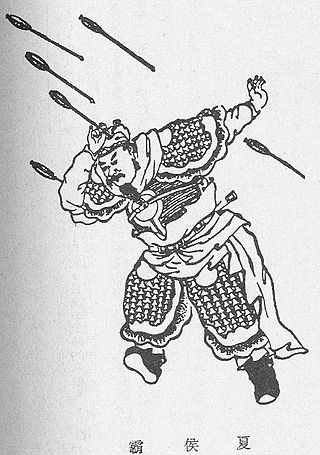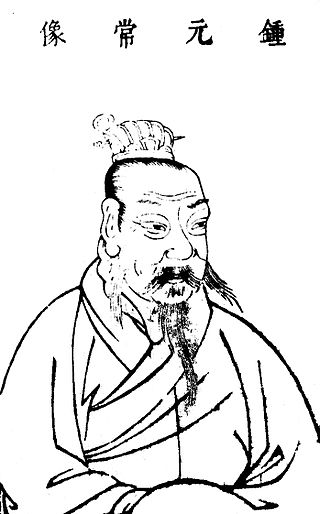Related Research Articles

Xiahou Dun, courtesy name Yuanrang, was a Chinese military general and politician serving under the warlord Cao Cao during the late Eastern Han dynasty of China. He served for a few months under Cao Cao's successor, Cao Pi, before his death. As one of Cao Cao's most trusted generals, Xiahou Dun aided the warlord in his campaigns against Lü Bu, Liu Bei, Sun Quan and others.

Xiahou Yuan, courtesy name Miaocai, was a Chinese military general and politician serving under the warlord Cao Cao in the late Eastern Han dynasty of China. He is known for his exploits in western China in the 210s, during which he defeated Cao Cao's rivals Ma Chao and Han Sui in Liang Province and the surrounding areas, and forced several Di and Qiang tribal peoples into submission. He was killed in action at the Battle of Mount Dingjun while defending Hanzhong Commandery from attacks by a rival warlord Liu Bei. Xiahou Yuan's death was highly dramatised in the 14th-century historical novel Romance of the Three Kingdoms, in which he was slain by Liu Bei's general Huang Zhong during a surprise raid.

Xiahou Ba, courtesy name Zhongquan, was a Chinese military general of the state of Cao Wei in the Three Kingdoms period of China. He was the second son of Xiahou Yuan, a prominent general who served under Cao Cao, the warlord who laid the foundation for the state of Cao Wei. Around 249, Xiahou Ba defected to Wei's rival state, Shu Han, after the regent Sima Yi seized power in a coup d'état. He died sometime between 255 and 259.

Chen Shou, courtesy name Chengzuo (承祚), was a Chinese historian, politician, and writer who lived during the Three Kingdoms period and Jin dynasty of China. Chen Shou is most known for his most celebrated work, the Records of the Three Kingdoms (Sanguozhi), which records the history of the late Eastern Han dynasty and the Three Kingdoms period. Chen Shou wrote the Sanguozhi primarily in the form of biographies of notable persons of those eras. Today, Chen's Records of the Three Kingdoms is part of the Twenty-Four Histories canon of ancient Chinese history.

Zhong Hui, courtesy name Shiji, was a Chinese calligrapher, essayist, military general, and politician of the state of Cao Wei during the Three Kingdoms period of China. He was the younger son of Zhang Changpu with Zhong Yao, who served as the Grand Tutor in the Wei imperial court. He was already known for being insightful, intelligent and knowledgeable since he was young. Zhong Hui rose to prominence in the 250s when he became a close aide to Sima Zhao, the regent and de facto ruler of Wei. He advised Sima Zhao on how to deal with the Third Rebellion in Shouchun from 257–258 and was highly regarded by the latter. With Sima Zhao's help, Zhong Hui steadily moved up the ranks and became one of the key figures in the Wei government.
Cao Xiu, courtesy name Wenlie, was a Chinese military general of the state of Cao Wei in the Three Kingdoms period of China. A distant younger relative of the warlord Cao Cao, Cao Xiu started his career in the late Eastern Han dynasty as a military officer under Cao Cao. In the early stages of the Hanzhong Campaign of 217–219, he outwitted Zhang Fei and defeated his subordinate officer Wu Lan (吳蘭). Later in his career, he became a provincial-level military commander and fought in various battles against Wei's rival state, Eastern Wu. He died in 228 shortly after the Wei defeat at the Battle of Shiting.
Xiahou Wei, courtesy name Jiquan, was a Chinese military general and politician of the state of Cao Wei during the Three Kingdoms period of China. He was the fourth son of Xiahou Yuan and a maternal great-grandfather of Emperor Yuan of the Eastern Jin dynasty.
Xu Rong was a military general serving under the warlord Dong Zhuo during the late Eastern Han dynasty of China.
Xiahou Xuan, courtesy name Taichu, was a Chinese essayist, historian, military general, philosopher, and politician of the state of Cao Wei during the Three Kingdoms period of China.

Zhong Yao, also referred to as Zhong You, courtesy name Yuanchang, was a Chinese calligrapher and politician who lived during the late Eastern Han dynasty and Three Kingdoms period of China. He served in the state of Cao Wei during the Three Kingdoms period. His calligraphy was highly regarded as he was known as one of the Four Worthies of Calligraphy (書中四賢) in the history of Chinese calligraphy.
Huan Jie, courtesy name Boxu, was a Chinese official who lived during the late Eastern Han dynasty and served under the warlord Cao Cao. After the fall of the Eastern Han dynasty, he briefly served in the state of Cao Wei during the Three Kingdoms period.
Han Hao, courtesy name Yuansi, he gained a reputation for loyalty and valor, comparable to Shi Huan. A military officer serving under the warlords Wang Kuang, Yuan Shu and Cao Cao during the late Eastern Han dynasty of China, he became a trusted official of Cao Cao.
Fu Gu (209–255), courtesy name Lanshi, was an official of the state of Cao Wei during the Three Kingdoms period of China.
Xiahou He, courtesy name Yiquan, was an official of the state of Cao Wei during the Three Kingdoms period of China.
Xin Xianying (191–269) was a Chinese noblewoman, aristocrat and advisor who lived during the Three Kingdoms period. She was a daughter of Xin Pi, an official of the state of Cao Wei. The only extant historical source about her life is her biography written by her maternal grandson, Xiahou Zhan (夏侯湛), who was a notable scholar and official of the Jin dynasty. She is best known for giving advice to her family members and relatives during significant events in the history of Cao Wei such as the Incident at the Gaoping Tombs and Zhong Hui's Rebellion.

Ma Zhong, courtesy name Dexin, originally named Hu Du, was a military general of the state of Shu Han during the Three Kingdoms period of China. Liu Bei was quite impressed by Ma Zhong and praised him highly, comparing him to the recently defected Huang Quan, Ma Zhong was trusted and respected by the following head of the government Zhuge Liang, Jiang Wan and Fei Yi. After Liu Bei's death, he served under Zhuge Liang during the Southern Campaign and helped to quell the rebellion. He was appointed as the area commander in the south after Li Hui's death. He spends most of his life pacify the region and protecting the people of the south often with the help of Zhang Ni. Ma Zhong was known as a generous and whimsical man but he was also decisive in handling affairs. Hence the southern tribes both feared him and respected him. His duty in the south could be comparable to Wang Ping in the north and Deng Zhi in the east. After his death, the foreigners sorely missed him and later established a temple in his honor.
Wei Feng, courtesy name Zijing, was a government official who lived in the late Eastern Han dynasty of China.
Sima Yi (179–251) was a general, politician and regent of the state of Cao Wei (220–266) in the Three Kingdoms period (220–280) in China. Two of his sons, Sima Shi (208–255) and Sima Zhao (211–265), rose to power in the 250s and consecutively served as regents throughout the reigns of the last three Wei emperors. After Sima Zhao died in September 265, his son Sima Yan (236–290) forced the last Wei ruler, Cao Huan (246–303), to abdicate the throne in his favour in February 266, ending the Wei regime and establishing the Jin dynasty (266–420). This article contains the family trees of Sima Yi, his brothers, and their descendants up to Sima Yan's generation. For more details on the family trees of the Jin emperors, see Chinese emperors family tree (early)#Jin Dynasty and Chu.
Zhang Changpu (199–257) was a concubine of Zhong Yao, a high minister of the state of Wei in the Three Kingdoms period of China. She was also the mother of Zhong Hui, a Wei general who played a significant role in the conquest of Wei's rival state, Shu, in 263. Her given name was not recorded in history; "Changpu" was actually her courtesy name. According to her biography written by Zhong Hui, she was a strict mother to Zhong Hui and played a significant role in his early education. She was also known for her virtuous conduct and wisdom.
She Yuan, courtesy name Wenxiong, was an official of the state of Shu Han in the Three Kingdoms period of China. She Yuan was among the 11 recorded officers of Liu Bei who persuaded him to declare himself "King of Hanzhong" (漢中王).
References
- ↑ Although Xiahou Hui's birth year was not recorded, his father died in c.February 219. Also, his elder brother Xiahou Rong was born in 207 (Rong was noted to have died at the age of 13 (by East Asian reckoning) soon after his father's death). Therefore, Xiahou Hui's birth year should be between 207 and 219.
- ↑ (威弟惠,乐安太守。<《文章叙录》曰:惠字稚权,幼以才学见称,善属奏议。历散骑黄门侍郎,与锺毓数有辩驳,事多见从。迁燕相、乐安太守。年三十七卒。>) Sanguozhi, vol.09 with annotation from Wenzhang Xulu
- Chen, Shou (3rd century). Records of the Three Kingdoms (Sanguozhi).
- Pei, Songzhi (5th century). Annotations to Records of the Three Kingdoms (Sanguozhi zhu).